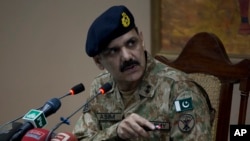Pakistan announced it has dismantled al-Qaida's main network in South Asia and foiled plans to break out of jail a man involved in the murder of journalist Daniel Pearl.
Lt. Gen. Asim Bajwa, the spokesman for Pakistan’s military, said they have arrested 97 militants, including Farooq Bhatti —also known as Musanna — the deputy chief of al-Qaida in the Indian Subcontinent (AQIS), 12 of the group’s financiers and 15 explosives experts. The head of this al-Qaida chapter is in Afghanistan, according to Bajwa.
Other arrests
He said Pakistan has also arrested senior leadership of a banned militant outfit, Lashkar e Jhangvi (LeJ), along with 10 of the group’s IED (improvised explosive device) experts and six suicide bombers. This group was working with AQIS to plan and execute attacks across Pakistan creating a nexus that was receiving support from the Pakistani Taliban.
Other arrests included 47 militants that belonged to a “common pool” of people used to carry out attacks.
The three commanders from AQIS and LeJ were paraded before the media after Bajwa’s news conference.
Progress in Karachi
Most of these arrests were made in Pakistan’s largest city Karachi during intelligence based operations carried out over a long period of time.
The city had suffered a major breakdown in law and order until Pakistan’s paramilitary force called the Rangers started an operation in September 2013 to clear it out.
The force has since carried out 7,000 operations, leading to a 70 percent reduction in target killings, an 85 percent reduction in extortions, and a 90 percent reduction in kidnappings for ransom, Bajwa told a press briefing.
Some of the major attacks carried out by the nexus of busted militant groups included one on Karachi’s airport as well as attacks on two of Pakistan’s naval bases and several offices of the country’s intelligence agency ISI.
Foiled plans for jail attack
The military spokesman also gave details about a foiled plan for an attack on a jail in Pakistan’s city of Hyderabad to break out 100 prisoners including Khalid Omar Sheikh who was involved in killing American reporter Daniel Pearl in 2002. The plan, he said, was 90 percent ready for execution when it was stopped.
Sheikh, a British national of Pakistani decent, was sentenced to death in 2002 for his hand in the murder of Pearl. His appeal is still pending.
The militants had rented a house in Hyderabad and started a business to sell plastic drums out of that house as a cover. Bajwa showed a video of the inside of the house, which was stocked with explosives, detonators and an explosives-grinding machine to help prepare suicide vests or rig cars with the material.
Police uniforms and backpacks used by security personnel found at the house indicated the militants were going to disguise themselves as local police during the attack. A handmade map of the facility indicated inside help. A police constable who worked at the jail was involved in the planning.
Military operation in tribal areas
Bajwa credited the success in busting the network, as well as reduction in violence in the rest of the country, to the army’s ongoing military operation to clear out militant hideouts in Pakistan’s tribal areas.
He said most of the planning for various attacks was done in Miranshah in North Waziristan tribal agency. “Suicide bombers were prepared there,” he said, and then sent to Karachi where members of AQIS or LeJ acted as facilitators.
Miranshah, he said, was like a marketplace where one could buy both people and materials to carry out attacks. The place has since been cleared out by operation Zarb e Azb, launched in June 2014.
He admitted, however, that work still remains.
“It’s a slow and frustrating process,” he said. “Once you arrest one man the network finds out and they disappear. Then you have to work twice as hard.”





